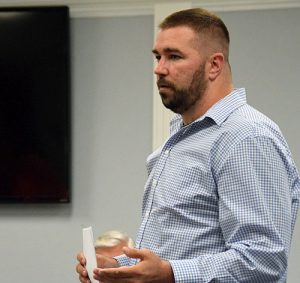Council mulls donation; OKs tax measures
DAVE MOSIER/independent editor
Van Wert City Council heard a presentation from Main Street Van Wert Project Manager Dan Baisden, who first gave an update on the alleyway project. Baisden said the project has met its minimum funding goals, with large donations from Van Wert Rotary Club and the Van Wert County Board of Commissioners. He also requested that City Council donate $750, the same amount as given by the commissioners, which Council took under advisement.
Baisden main reason for coming to City Council was to talk about the National Register of Historic Places program that his organization is pursuing. He noted that, currently, buildings built prior to 1936 are only eligible for a 10 percent tax cut currently. Under the National Historic Register program, buildings 50 years old and older could receive a guaranteed 20 percent federal tax credit, as well as apply for a competitive grant that would provide up to a 25 percent state tax credit.

Baisden provided an example, noting that on an $8 million downtown project, current downtown building owners would receive a credit of $800,000, while if the historic building registry was in place, that amount could increase to a maximum of $3.1 million if both tax credits are awarded.
Baisden said the program is a good deal for building owners and long-term lessees, since it doesn’t require them to do anything specifically to the buildings, such as rehabilitate or restore them, or even protect them from demolition. He did add, though, that U.S. Department of Interior Rehabilitation Standards apply when receiving tax credits for a project.
He noted that studies show that having one empty building in a downtown district for a year results in $250,000 in lost sales, $12,500 in lost state and local tax revenues, $15,000 in lost rents, $51,000 in lost loan demand for local banks for the building, $15, in lost loan demand for the business, $24,750 in lost business profits and owner compensation, and $16,250 in lost employee payroll.
The problem for MSVW in applying for the National Historic Places Registry, Baisden added, is the complexities of applying for the program. A consultant is needed to spearhead the application, which Baisden said would cost $20,000. A grant included would provide $12,000 of that amount, leaving $8,000 to fund through local sources.
The MSVW program manager said he was asking City Council to consider providing some portion of that amount to help fund the application process. Council also took that request under advisement and a Finance Committee meeting will be held next month.
During a brief report, Mayor Jerry Mazur said he was pleased to announce that, within the next 28 days, the city would likely own the former Clark Service Station property at the corner of Jackson and Main streets. The cost to the city would be a $127 court fee.
The mayor, speaking for Safety-Service Director Jay Fleming, who was not at the meeting, said work on the Woodland Avenue street reconstruction project would begin August 1.
Health-Safety-Service Committee Chair Bill Marshall also talked about a marijuana moratorium proposal discussed in a meeting held prior to the regular City Council meeting.
Legislation was prepared that would provide
City Auditor Martha Balyeat said she has been in contact with the State Auditor’s Office on the possibility of conducting a performance audit for the city, with auditor’s office staff members stating that it doesn’t feel enough cost savings can be realized from a performance audit here to justify doing one.
Mayor Mazur said that announcement is a positive, since it indicates the city is not wasting resources and is being financially responsible.
During his report, City Law Director John Hatcher requested a meeting with Council President Pete Weir and Judiciary and Annexation Committee Chair Jon Tomlinson to develop a new agenda for City Council meetings, based on the changes to Chapter 30 of the city’s codified ordinances that deal with how City Council operates.
The changes include starting Council meetings at 6:30 p.m. instead of the current 7:30 p.m., having some minor committee topics dealt with in regular Council meetings, and the inclusion of a consent agenda.
Legislatively, City Council approved an ordinance that would increase the tax credit for city residents who work outside the city from 25 percent to 50 percent. The legislation is contingent on passage of the 0.28-percent city income tax increase in November. A measure placing the tax increase on the November ballot was also passed.
In addition, a measure approving a jobs creation incentive program was also passed by Council, while changes to city ordinances related to stray animals was also prepared.
POSTED: 07/25/17 at 7:36 am. FILED UNDER: News







